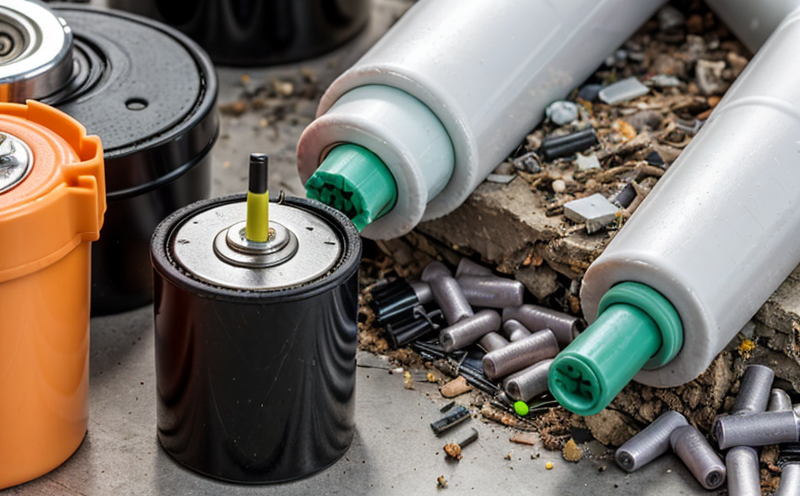NF EN 62619 Recycling Testing of Industrial Lithium Batteries
The NF EN 62619 standard is designed to ensure that industrial lithium batteries are recycled in an environmentally responsible manner. This standard covers the recycling process, including the recovery and treatment stages, as well as the reuse or final disposal of materials derived from the recycling process.
Industrial lithium batteries have unique challenges when it comes to recycling due to their high energy density and variety of chemical compositions. Proper recycling ensures that valuable resources are recovered while minimizing environmental impact. This service provides comprehensive testing according to NF EN 62619, ensuring compliance with international standards and best practices.
The testing process involves several key stages:
- Sample preparation: Lithium batteries undergo rigorous sample preparation to ensure that they are representative of the entire batch.
- Disassembly: The batteries are carefully disassembled into their constituent parts, including metal components and electrolytes.
- Material extraction: Extracted materials are analyzed for their purity and potential reuse. This step is crucial for determining the recyclability of the battery.
- Environmental impact assessment: Throughout the process, environmental metrics are continuously monitored to ensure compliance with NF EN 62619.
The results of this testing provide critical insights into the efficiency and sustainability of industrial lithium battery recycling processes. Compliance with NF EN 62619 not only ensures regulatory adherence but also enhances a company's reputation for environmental stewardship.
Our laboratory is equipped with state-of-the-art facilities that can handle large-scale sample testing, ensuring accurate and reliable results. By leveraging our expertise in battery recycling and end-of-life testing, we provide clients with detailed reports that outline the performance and potential of recycled materials.
Applied Standards
| Standard | Description |
|---|---|
| NF EN 62619 | This standard provides a framework for the recycling of industrial lithium batteries, covering aspects such as recovery, treatment processes, and reuse or final disposal. |
| ISO 14001 | An international standard that sets out the requirements for an environmental management system, which is integral to NF EN 62619 compliance. |
Benefits
The benefits of adhering to NF EN 62619 are manifold. Firstly, it ensures that industrial lithium batteries are recycled in a manner that is both efficient and environmentally friendly. This not only reduces waste but also conserves valuable resources. Secondly, compliance with this standard can lead to cost savings by recovering materials that could otherwise be discarded. Additionally, companies that demonstrate adherence to such standards often enjoy enhanced reputations among consumers who prioritize environmental responsibility.
Furthermore, the testing process outlined in NF EN 62619 helps identify potential improvements in recycling processes, leading to more effective and sustainable operations. This is particularly important in industries where sustainability is a key concern, as it ensures that companies are at the forefront of best practices.
The results of our testing can also be used to inform product design and development, ensuring that future products are easier to recycle and have minimal environmental impact. This forward-thinking approach not only benefits the environment but also contributes to long-term business success.
Competitive Advantage and Market Impact
In today's competitive market, companies that demonstrate a commitment to sustainability are increasingly valued by consumers. By offering NF EN 62619 recycling testing services, we help our clients gain a significant advantage in this regard. Compliance with international standards not only enhances a company's reputation but also opens up new markets and opportunities for growth.
Our expertise in battery recycling and end-of-life testing enables us to provide detailed insights into the performance of recycled materials, which can be used to improve product design and manufacturing processes. This forward-thinking approach ensures that our clients are ahead of the curve when it comes to sustainability practices.
In addition, by ensuring compliance with NF EN 62619, we help our clients avoid potential legal and regulatory risks associated with improper disposal or recycling of industrial lithium batteries. This proactive approach can save companies from costly fines and reputational damage. Ultimately, the testing services offered here contribute to a more sustainable future while also supporting business growth.





